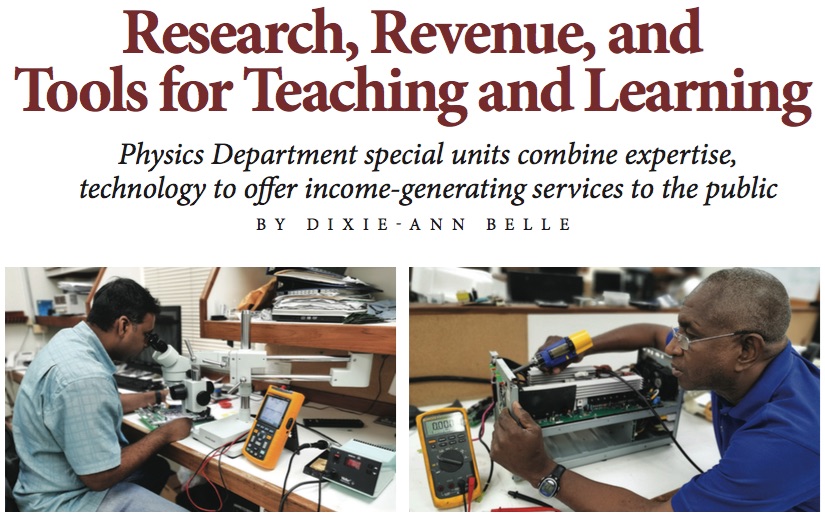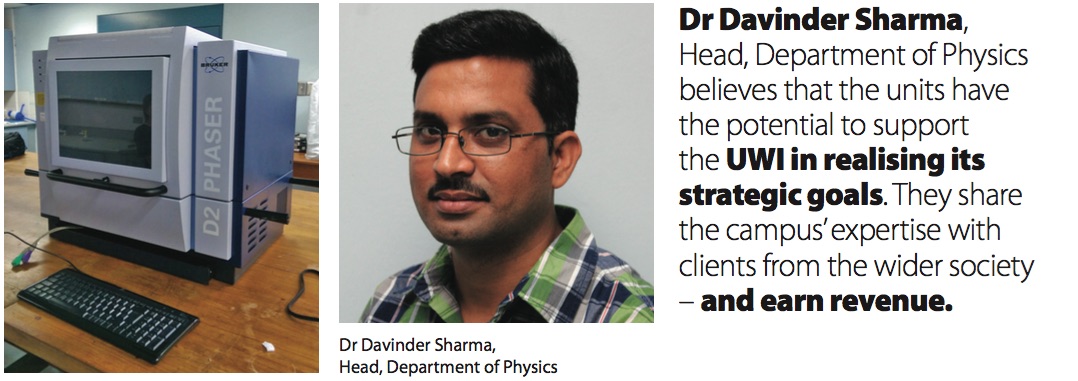
There has always been something otherworldly about the Natural Sciences Building at UWI St Augustine. The historic home of the Faculty of Science and Technology, students have walked its halls, climbed its stairs, and taken part in its classes and labs for decades. There’s a whole Zoology Museum filled with many exotic and enthralling species of plants and animals. Then there’s the Physics Department.
This department, dedicated to the study of the universe and its fundamental forces, has become home to special units that support its programmes of study and research, serve the campus, and provide revenue generating services to the public. What kind of services? They range from detection and analysis of materials useful for the energy sector, agriculture, and construction; to powerful imagery generation technology for medical research and engineering; to even repairing a client’s specialised equipment.
The units are the Electronics Workshop, the Electron Microscopy Unit, the X-Ray Diffraction (XRD) Unit and the Mechanical Woodwork Shop. The first three are particularly active, with staff members applying their practical knowledge of science and technology to a variety of tasks and research projects which rival what you might have seen on the television show The Big Bang Theory. Among their clients are the Tobago House of Assembly, CARIRI, and the Trinidad and Tobago Bureau of Standards.
Dr Davinder Sharma, Head, Department of Physics believes that the units have the potential to support the UWI in realising its strategic goals. They share the campus’ expertise with clients from the wider society – and earn revenue. The department’s Master of Science (MSc) in Renewable Energy Technology and Master of Biomedical Physics programmes are some of their major sources of income, but the units are also doing their part on a smaller but significant scale.

The Electronics Workshop commenced operations in 1995 and is currently supervised by Mr Michael “Noel” Charles. The workshop provides maintenance services (for electronic lab and testing equipment, and computers and their peripherals), student project assistance, research and development, along with practical electronic training for the BSc Biomedical Technology programme. They also offer services to institutions, companies, and schools.
The XRD Unit houses a Bruker X-Ray Powder Diffraction system which was upgraded in 2015. It allows for non-destructive x-ray diffractometry for powder and particulate samples. The unit’s Chief Engineering Technician Mr Shazaad Ali Shah, explains that they bombard samples of fine grains and powders with x-rays as the samples are rotated 180 degrees. Once that is done, “the diffracted x-rays are analysed by a collector-tube. We then use a specialised software for peak detection, mineral/material identification, and structural analysis.”
The XRD machine can be used for crystallography, a science concerned with the structure and properties of crystals. Organisations have used the service for oil exploration, volcanic material identification, fertiliser content, and asphalt quality to determine viability and set quality controls.
“Just recently a postgraduate candidate published a paper in a reputed journal about different kidney stone identifications,” says Ali Shah.
“This data can be used in future developments or for maintaining quality controls,” he explains. “It simply depends how we decide to interpret all the data we get.”
Led by Development Engineer Mr David Hinds, the team of the Electron Microscopy Unit harnesses the power of a Transmission Electron Microscope (TEM) to capture eye-popping images of the ultra-structure of biological and non-biological materials. They examine plant and animal tissue, bacteria and viruses, and non-biological samples. The unit’s Scanning Electron Microscope (SEM) produces high-resolution imaging of surfaces and can do elemental analysis, imaging, mapping, line scan, and report generation. The team has used it to examine animal and plant tissue, teeth for dental research, bacteria, fossils, nanomaterials and more.
Referring to the university’s goal of “improving the quality, quantity and impact of research, innovation and publication”, Dr Sharma declares, “we are basically motivating impactful research work within the university.” He states that the XRD and Electron Microscopy units are instrumental to researchers not only in physics, but in areas like chemistry, medical sciences and other engineering departments.
“We encourage school students and others interested to visit and see how actually it works and what careers can be [pursued] worldwide after having expertise in them, along with a degree from The UWI.” One possibility could be the field of material science which he says has exciting potential and for which scientists have been awarded Nobel prizes.
Even though the units charge for their services, they are able to offer those services to clients at costs that are generally less than other options available in Trinidad.
The Electronics Workshop also saves precious university finances because the team repairs equipment across the campus. Charles notes that his staff’s duties include “equipment maintenance, acquisition of equipment and parts, commissioning and decommissioning of equipment, assisting students with their research projects, training, research and development and consultation”. Recently, they developed a prototype of an ultraviolet disinfectant robot for sanitisation against COVID-19. Its efficacy is being tested.
Their services are sought across the campus for a wide variety of tasks. Some surprises can appear on their to-do lists.
“One of the more interesting requests we received was the repair of a cattle orgasmic probe. This probe is inserted anally to stimulate the bull to produce semen,” remarks Charles.
Pointing out that seeking repairs of research and general equipment outside of the campus could be expensive, Dr Sharma says that the work of the unit saves The UWI thousands of dollars.
The Department’s goals for the units involve expanding their reach outside of the university and improving the services they offer, assisting in The UWI’s objective to “increase and improve academic/industry research partnerships”.
Dr Sharma says they are working to procure a 3D printer and a troubleshooting kit at motherboard level for the Electronics Workshop, and looking at the possibility of providing certification for various medical equipment and developing renewable energy kits for schools. They are also preparing a proposal to procure a new SEM and a new TEM for the Electron Microscopy Unit.
Recently, they received samples of nanomaterials from India, and they are ready to take on more exciting projects in the Caribbean and beyond.
“We are getting ready to fulfill outside customer demand,” affirms Dr Sharma.
The units pride themselves on knowing the importance of excellent customer service, and their high level of expertise, knowledge and experience in their staff. The team in the Electronics Workshop, for example, cover over 75 years of combined experience, with qualifications ranging from engineering degrees to diplomas in Electrical and Electronics Engineering Technology (EEET).
Dr Sharma highlights the competitive cost of the services in the units, and says that they offer the added benefit of the knowledge and experience to provide consultations and help with problem solving.
“We can help industry to develop their projects,” he observes. “We can collaborate with them and do industrial level projects to solve their specific problems.”
Electronics Workshop
Website: https://sta.uwi.edu/fst/electronics/index.asp
Telephone: 1-868-662-2002, Ext. 82317
1-868-662-6134
Email: ews.s@sta.uwi.edu
XRD Unit
Website: https://sta.uwi.edu/fst/physics/x-ray-diffraction,
Email: sadira.khan@sta.uwi.edu, adrian.gayah@sta.uwi.edu
Electron Microscopy Unit
Website: https://sta.uwi.edu/fst/physics/electronmicroscope
Email - david.hinds@sta.uwi.edu
emu@sta.uwi.edu